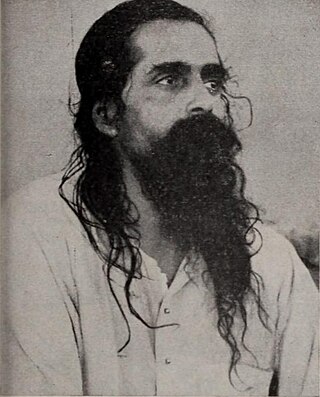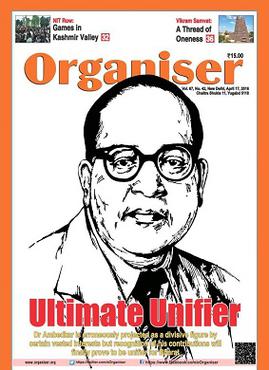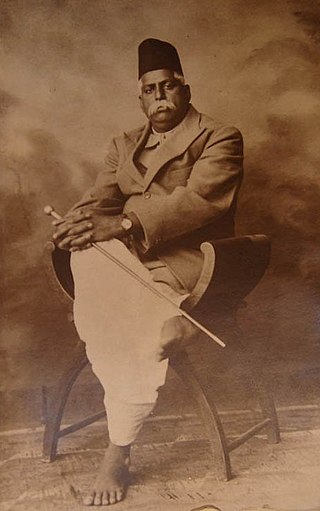
The Rashtriya Swayamsevak Sangh is an Indian right-wing, Hindu nationalist volunteer paramilitary organisation. It is the progenitor and leader of a large body of organisations called the Sangh Parivar, which has developed a presence in all facets of Indian society and includes the Bharatiya Janata Party, the ruling political party under the Prime Minister Narendra Modi. The present Sarsanghchalak of the RSS is Mohan Bhagwat.

Keshav Baliram Hedgewar, also known by his moniker Doctorji, was an Indian physician and the founding Sarsanghachalak of the Rashtriya Swayamsevak Sangh (RSS). Hedgewar founded the RSS in Nagpur in 1925, based on the ideology of Hindutva with the intention of creating a Hindu Rashtra.
Kuppahalli Sitaramayya Sudarshan was an Indian activist and the fifth Sarsanghachalak of the Rashtriya Swayamsevak Sangh (RSS), a Hindu nationalist organisation from 2000 to 2009.

Madhav Sadashivrao Golwalkar, popularly known as Guruji was the second Sarsanghchalak ("Chief") of the Rashtriya Swayamsevak Sangh (RSS). Golwalkar is considered one of the most influential and prominent figures among Rashtriya Swayamsevak Sangh. He was the first person to put forward the concept of a cultural nation called "Hindu Rashtra" which is believed to have evolved into the concept of the "Akhand Bharat Theory", united nations for Bharatiyas. Golwalkar was one of the early Hindu nationalist thinkers in India. Golwalkar authored the book We, or Our Nationhood Defined. Bunch of Thoughts is a compilation of his speeches.

Hindu Swayamsevak Sangh is a non-profit, social, educational, and cultural organization of the Hindus living outside India. It was founded in 1940s in Kenya, it is currently active in 156 countries and estimates 3289 branches.

Organiser is an affiliated publication of the right wing, Hindu organisation Rashtriya Swayamsevak Sangh (RSS), launched as a newspaper in 1947 in the weeks before the Partition of India. Despite its professed claims of independence, it is regarded by scholars as an official organ of the RSS. The newspaper has been edited by A. R. Nair, K. R. Malkani, L. K. Advani, V. P. Bhatia, Seshadri Chari and Dr R. Balashanker. The current editor is Prafulla Ketkar. Organiser was relaunched in a magazine format since the edition of 1 April 2014.
Balraj Madhok was an Indian political activist and politician from Jammu. Originally an activist of the nationalist organisation Rashtriya Swayamsevak Sangh (RSS), he later worked as a politician in the Bharatiya Jan Sangh (BJS). Madhok was instrumental in launching the RSS in the princely state of Jammu and Kashmir and later the political party Jammu Praja Parishad for representing the interests of Jammu Hindus. He eventually rose to become the president of the Bharatiya Jana Sangh and led its successful contest in the general election of 1967. He resigned from the party afterwards due to political differences with Atal Bihari Vajpayee and L. K. Advani.
Bhai Mahavir was an Indian politician who was governor of the Indian state of Madhya Pradesh between April 1998 and March 2003. He was a pracharak of the Rashtriya Swayamsevak Sangh (RSS) and served as a leader of the Bharatiya Jana Sangh and Bharatiya Janata Party. He has authored many books and had served two terms prior to his governorship as a member of the Rajya Sabha. He had an M.A. and Ph.D. in Economics and studied Law (LLB) from the University of Delhi.

Kushabhau Thakre was an Indian politician belonging to the Bharatiya Janata Party and a Member of parliament.

Chandikadas Amritrao Deshmukh BR, better known as Nanaji Deshmukh, was a social reformer and politician from India. He worked in the fields of education, health, and rural self-reliance. He was posthumously awarded the Bharat Ratna, India's highest civilian award in 2019 by the Government of India. He was a leader of the Bharatiya Jana Sangh and also a member of the Rajya Sabha.

Madhukar Dattatraya Deoras, was the third Sarsanghchalak of the Rashtriya Swayamsevak Sangh (RSS).

Vanavasi Kalyan Ashram is an Indian social welfare organization based in Jashpur, in the Chhattisgarh state of India. It focuses on the welfare activities of members of Scheduled Tribes in remote areas of India. The organization is a constituent of the Sangh Parivar, the family of organisations affiliated with the Rashtriya Swayamsevak Sangh, (RSS).

Mohan Madhukarrao Bhagwat is a political activist and veterinarian who is currently serving as the 6th and current Sarsanghchalak of the Rashtriya Swayamsevak Sangh in India Since 2009.

Eknath Ramakrishna Ranade was a social activist and leader that led the Rashtriya Swayamsevak Sangh.
Hindu nationalism has been collectively referred to as the expression of social and political thought, based on the native spiritual and cultural traditions of the Indian subcontinent. "Hindu nationalism" is a simplistic translation of हिन्दू राष्ट्रवाद. It is better described as "Hindu polity".
Madhukar Rao Bhagwat was one of the earliest Swayamsevak of the Rashtriya Swayamsevak Sangh. He first started as a Pracharak of Gujarat and later became President of the Chandrapur district and Gujarat’s regional promoter of RSS. He was close to past Sarsanghchalaks including Keshav Baliram Hedgewar and M. S. Golwalkar, and is the father of present RSS Sarsanghchalaks Mohan Bhagwat.
Umakant Keshav Apte, also known as Babasaheb Apte, was one of the first pracharaks of the Hindu nationalist organisation Rashtriya Swayamsevak Sangh (RSS), taking initiation from its founder K. B. Hedgewar. Upon his death, the Babasaheb Apte Smarak Samiti was set up in his honour by RSS pracharak Moropant Pingle, which has been active in commissioning and publishing research on the history of ancient India.
Mauli Chandra Sharma was a senior Indian politician, originally of the Indian National Congress. He was a founding member of the Bharatiya Jana Sangh, serving as its Vice-President and President, before being forced out by the Rashtriya Swayamsevak Sangh activists in the party in 1954.

Hedgewar Smruti Mandir (HSM) is a memorial in Reshimbagh, Nagpur, Maharashtra, India dedicated to K. B. Hedgewar and M. S. Golwalkar, who were the first two leaders of the Hindu nationalist organisation Rashtriya Swayamsevak Sangh (RSS). It was inaugurated in 1962. It was granted tourism status on the recommendation of the Maharashtra Tourism Development Corporation (MTDC) in 2017, but this decision is mired in controversy.